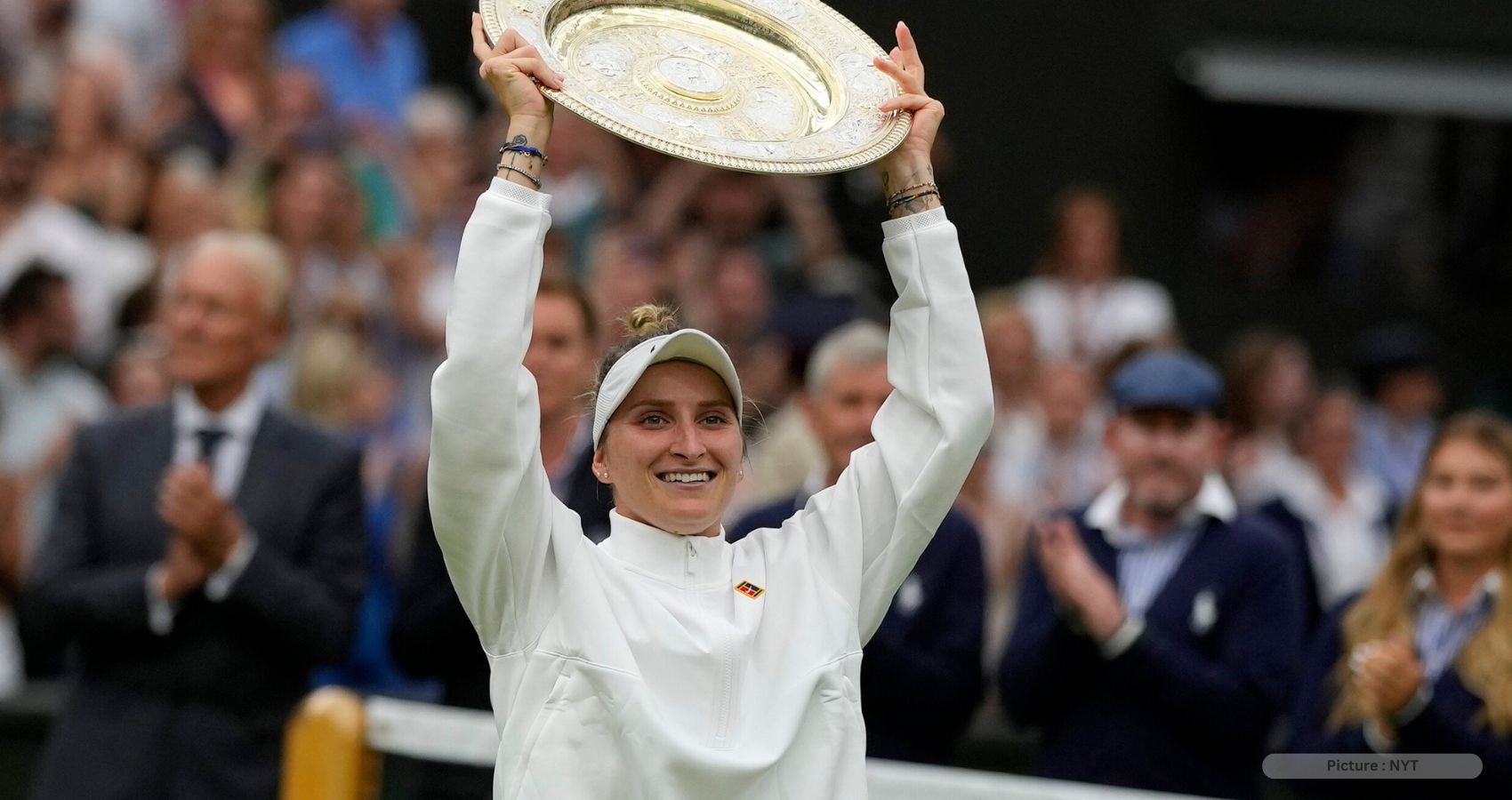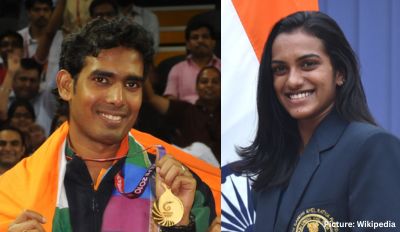The Czech Republic’s Marketa Vondrousova is no longer one of the most unlikely Wimbledon champions. Vondrousova stunned herself, her family, and the tennis world when she defeated Ons Jabeur, a pioneering Tunisian who was a heavy favorite, in straight sets, 6-4, 6-4.
Vondrousova, 24, turned into the principal unseeded player to win Wimbledon and the most recent in a long queue of Czech-conceived ladies to lift the main prize in the game, returning to Martina Navratilova’s mastery of Wimbledon during the 1980s, after Navratilova had deserted to the US.
Vondrousova is a left-handed player with a nasty slice serve, like Navratilova, who watched the match from a box. She used it in the tenseest moments throughout the afternoon when Jabeur attempted to take control of the match or mount yet another comeback.
The similitudes with Navratilova, a forceful serve-and-volleyer who burst into the game as a youngster, for the most part end there.
Vondrousova, who won a mistake filled match that compensated for what it needed quality with shock, is currently a definitive unnoticed player subsequent to going three-for-three at pulverizing tennis fantasies. In 2021, she defeated Naomi Osaka at the Olympics in Tokyo, just a few days after Osaka set the Olympic standard as a favorite to win a gold medal at home.
On Thursday, Vondrousova defeated Elina Svitolina, a Ukrainian new mother who fought hard to reach the semifinals and inspired her people as they fight against Russia’s invasion.
On Saturday evening it was Jabeur’s chance to have her fantasy squashed by Vondrousova’s precarious and unconventional game in a competition that Vondrousova said was difficult to win, given her sparse history of progress on grass.
“At the point when we came I was very much like, ‘Attempt to win two or three matches,'” Vondrousova said. ” Presently this occurred, it’s insane,” Vondrousova said.
She had a lot of organization asking exactly the same thing, taking into account she had a cast on her wrist following a medical procedure during Wimbledon last year. This time, Vondrousova’s husband decided to stay at home and care for their bald Sphynx cat instead of coming to watch her play on Saturday.
Stepan Simek, on the other hand, rushed to find a cat sitter after Vondrousova defeated Svitolina in the semifinals and boarded a flight to watch his wife play in the Wimbledon final. They intended to commemorate their first wedding anniversary on Sunday.
“There will be one day we will have grandchildren and I’m simply anticipating the day when I can recount the narrative of their grandma winning Wimbledon,” Simek said.
Vondrousova’s dearest companion and copies accomplice, Miriam Kolodziejova, said she didn’t really accept that Vondrousova could bring home the singles championship.
She stated, “It’s like a dream for us.”
For Jabeur, the misfortune in a moment straight Wimbledon last against a cultivated undeniably less rival than different ladies she thump en route to the slope of tennis history, was nothing not exactly disastrous. Jabeur has now lost three of the last five Huge homerun finals, missing the mark regarding turning into the main lady of Middle Easterner drop and from Africa to come out on top for the main titles in tennis.
She, like the majority of tennis players, has long desired to win Wimbledon, and the previous year, she set her phone’s lock screen to a picture of the women’s trophy.
In the first set, Jabeur broke a nervous Vondrousova’s serve multiple times. She played tight from the outset yet held a 4-2 lead in the main set when she started to unwind, sending forehands into the net and drifting strikes past the gauge.
Jabeur lost her serve to begin the second set and was down a set before she knew it. As far as concerns her, Vondrousova was doing all she expected to, keeping the ball in play, whipping her twisting, turning shots that were so not quite the same as the power which Jabeur had looked in her new matches.
Jabeur regained her composure and even took a 3-1 lead in the second set, but she was unable to recover, was unable to locate the court, and threw too many shots into the middle of the net. Five of her last six games were defeats.
Vondrousova at long last finished Jabeur’s horrendous evening with a running strike volley out of the shadows court, and one more lady from Czech Republic was the Wimbledon champion, staggering anybody who could have imagined that situation however only not with Vondrousova in the featuring job.
“My mentor let me know after the last, he was like, ‘I was unable to accept how quiet you are,'” Vondrousova said. ” That was the title’s primary key.
Jabeur, who is known as the “Minister of Happiness” due to her almost always upbeat demeanor, removed her bandana from her head as the ball twice bounced far out of her reach. She then began her slow, sad, and becoming more and more familiar plod toward the net.
Vondrousova arrived a little behind schedule. At the end of the final point, she had collapsed on the grass. She got up to give Jabeur a hug, but she was soon back in the middle of the court, kneeling, trying to figure out how she had done this unlikely run. Jabeur sat in her seat and cleaned away tears.
There were seriously during the prize service, as Jabeur held the second place platter in one hand and covered her eyes and her nose with the other.
She said, “This is the most painful loss of my career,” before attempting to channel some positive energy.
“I won’t surrender, and I will return more grounded,” she let a group know that was at long last ready to thunder for her the manner in which it had been needing to throughout the evening.
For Vondrousova and Czech tennis, the festivals were simply starting. The Czech Republic, with a populace of generally 10.5 million individuals, has turned into a ladies’ tennis production line dissimilar to anything that exists in the game. There are eight Czech ladies in the best 50, the majority of them, as Vondrousova, in their mid-twenties and more youthful.
At the point when the competition started, Petra Kvitova, positioned tenth on the planet, seemed like the most probable Czech finalist. A double cross Wimbledon champion in 2011 and 2014, Kvitova had won a grass court competition in Berlin only weeks prior.
There were really during the prize service, as Jabeur held the second place platter in one hand and covered her eyes and her nose with the other.
She said, “This is the most painful loss of my career,” before attempting to channel some positive energy.
“I won’t surrender, and I will return more grounded,” she let a group know that was at long last ready to thunder for her the manner in which it had been needing to throughout the evening.
For Vondrousova and Czech tennis, the festivals were simply starting. With roughly 10.5 million people, the Czech Republic has transformed into a women’s tennis manufacturing facility unlike any other in the sport. There are eight Czech women in the top 50, most of whom are in their mid-20s or younger, like Vondrousova.
Petra Kvitova, ranked 10th worldwide, appeared to be the most likely Czech finalist when the tournament began. A double cross Wimbledon champion in 2011 and 2014, Kvitova had won a grass court competition in Berlin only weeks prior.
Watching Muchova had enlivened Vondrousova, who had made the French Open last in 2019 when she was only 19-years of age. Muchova’s profession had likewise gotten derailed wounds yet there she was playing on one of the game’s greatest stages.
Like Muchova, Vondrousova didn’t be aware at first whether specialists would have the option to take care of her wrist issue. The injury sidelined her for a drawn out period, and Simek said it caused her to see the value in tennis more.
“You can’t play, play tennis as work, you need to appreciate it, you need to adore it,” Simek said. ” She truly appreciates it and she adores the game. She even enjoys watching the game, something that I don’t think many players do.
Vondrousova began a steady march through seven opponents at Wimbledon, including five seeded players and several known for their grass-court prowess, such as Jabeur. Muchova lost in the first round, but Vondrousova won the rest of the tournament. Jessica Pegula had a game point and a 4-1 lead in the final set in the quarterfinals, but Vondrousova came back and won the final five games.
Then, at that point, came her last two matches against rivals playing for purposes a lot bigger than themselves, a weight that can both stimulate and engage yet in addition debilitate and trouble a player.
Svitolina and Jabeur came to Centre Court tight and flat against Vondrousova, shadows of the players who had thrilled crowds and promised a comeback that would be talked about for years, if not decades. On the opposite side of the net was Vondrousova, a player most popular for the body workmanship on her arms, who had made a wagered with her mentor, Jan Mertl, a previous Czech player, that assuming she won a Huge homerun he would get a tattoo to honor the victory. Holding her victor’s platter, Vondrousova said they would head the tattoo parlor on Sunday.










